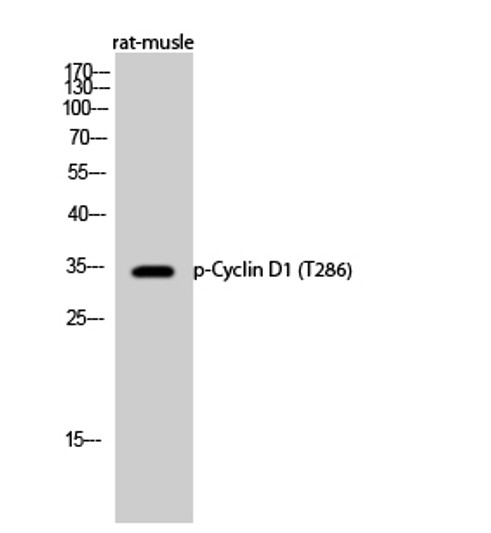| Host: | Rabbit |
| Applications: | WB/IHC/IF/ELISA |
| Reactivity: | Human/Mouse/Rat |
| Note: | STRICTLY FOR FURTHER SCIENTIFIC RESEARCH USE ONLY (RUO). MUST NOT TO BE USED IN DIAGNOSTIC OR THERAPEUTIC APPLICATIONS. |
| Short Description : | Rabbit polyclonal antibody anti-Phospho-G1/S-specific cyclin-D1-Thr286 (246-295 aa) is suitable for use in Western Blot, Immunohistochemistry, Immunofluorescence and ELISA research applications. |
| Clonality : | Polyclonal |
| Conjugation: | Unconjugated |
| Isotype: | IgG |
| Formulation: | Liquid in PBS containing 50% Glycerol, 0.5% BSA and 0.02% Sodium Azide. |
| Purification: | The antibody was affinity-purified from rabbit antiserum by affinity-chromatography using epitope-specific immunogen. |
| Concentration: | 1 mg/mL |
| Dilution Range: | WB 1:500-1:2000IHC 1:100-1:300ELISA 1:10000IF 1:50-200 |
| Storage Instruction: | Store at-20°C for up to 1 year from the date of receipt, and avoid repeat freeze-thaw cycles. |
| Gene Symbol: | CCND1 |
| Gene ID: | 595 |
| Uniprot ID: | CCND1_HUMAN |
| Immunogen Region: | 246-295 aa |
| Specificity: | Phospho-Cyclin D1 (T286) Polyclonal Antibody detects endogenous levels of Cyclin D1 protein only when phosphorylated at T286. |
| Immunogen: | The antiserum was produced against synthesized peptide derived from the human Cyclin D1 around the phosphorylation site of Thr286 at the amino acid range 246-295 |
| Function | Regulatory component of the cyclin D1-CDK4 (DC) complex that phosphorylates and inhibits members of the retinoblastoma (RB) protein family including RB1 and regulates the cell-cycle during G(1)/S transition. Phosphorylation of RB1 allows dissociation of the transcription factor E2F from the RB/E2F complex and the subsequent transcription of E2F target genes which are responsible for the progression through the G(1) phase. Hypophosphorylates RB1 in early G(1) phase. Cyclin D-CDK4 complexes are major integrators of various mitogenenic and antimitogenic signals. Also a substrate for SMAD3, phosphorylating SMAD3 in a cell-cycle-dependent manner and repressing its transcriptional activity. Component of the ternary complex, cyclin D1/CDK4/CDKN1B, required for nuclear translocation and activity of the cyclin D-CDK4 complex. Exhibits transcriptional corepressor activity with INSM1 on the NEUROD1 and INS promoters in a cell cycle-independent manner. |
| Protein Name | G1/S-Specific Cyclin-D1B-Cell Lymphoma 1 ProteinBcl-1Bcl-1 OncogenePrad1 Oncogene |
| Database Links | Reactome: R-HSA-187577Reactome: R-HSA-1912408Reactome: R-HSA-3214858Reactome: R-HSA-6785807Reactome: R-HSA-69231Reactome: R-HSA-75815Reactome: R-HSA-8849470Reactome: R-HSA-8853884Reactome: R-HSA-8878166Reactome: R-HSA-8934593Reactome: R-HSA-8951430Reactome: R-HSA-8951936Reactome: R-HSA-9018519Reactome: R-HSA-9634638Reactome: R-HSA-9661069Reactome: R-HSA-9754119Reactome: R-HSA-9825892 |
| Cellular Localisation | NucleusCytoplasmNucleus MembraneCyclin D-Cdk4 Complexes Accumulate At The Nuclear Membrane And Are Then Translocated To The Nucleus Through Interaction With Kip/Cip Family Members |
| Alternative Antibody Names | Anti-G1/S-Specific Cyclin-D1 antibodyAnti-B-Cell Lymphoma 1 Protein antibodyAnti-Bcl-1 antibodyAnti-Bcl-1 Oncogene antibodyAnti-Prad1 Oncogene antibodyAnti-CCND1 antibodyAnti-BCL1 antibodyAnti-PRAD1 antibody |
Information sourced from Uniprot.org











